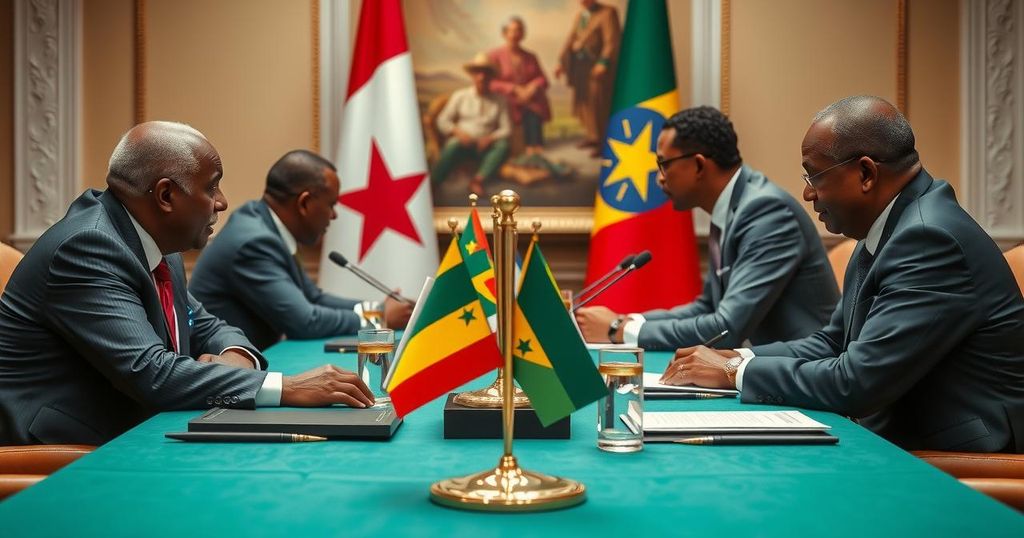Global news
AFRICA, AFRICAN UNION, AFRICAN UNION COMMISSION, AU, DIPLOMACY, EAST AFRICA, ETHIOPIA, EUROPE/ASIA, HASSAN SHEIKH MOHAMUD, INTERGOVERNMENTAL AUTHORITY ON DEVELOPMENT, INTERNATIONAL RELATIONS, MOUSSA FAKI MAHAMAT, REC, REGIONAL COOPERATION, SOMALIA, SOMALILAND, TURKEY, WORK, WORKNEH GEBEYEHU
Jamal Walker
0 Comments
African Union Calls for Urgent Action on Somalia-Ethiopia Agreement
The African Union has urged Ethiopia and Somalia to promptly implement their recent agreement to resolve longstanding tensions concerning Ethiopia’s access to the sea. This agreement follows Ethiopia’s controversial deal with Somaliland for coastal control, which Somalia deemed a violation of its sovereignty. Urgent actions are required to foster cooperation and mitigate the risk of conflict in the region.
On Thursday, the African Union (AU) called upon Ethiopia and Somalia to expedite the implementation of their recent agreement aimed at alleviating tensions between the two nations regarding Ethiopia’s access to maritime routes. The deal, deemed a significant development, arises from previous conflicts stemming from Ethiopia’s leasing of coastline from Somaliland, a region that has sought independence from Somalia. The AU emphasized the urgency of executing the measures agreed upon to enhance cooperation between the countries.
The tensions between Ethiopia and Somalia escalated following Ethiopia’s January agreement with Somaliland to establish a port and military base on the coast. The conflict intensified when Somalia labeled the agreement as a breach of its sovereignty, raising concerns over potential unrest in the region. Following extensive negotiations mediated by Turkey, an “historic” agreement was announced, yet the specifics remain unclear.
AU Commission Chairman Moussa Faki Mahamat acknowledged the agreement as a critical step for peace but insisted on immediate action to implement it. Likewise, the Intergovernmental Authority on Development (IGAD) praised the agreement for its demonstration of commitment for peaceful resolution. Both sides pledged to leave behind disagreements and work collaboratively toward shared prosperity, engaging in technical dialogues to solidify Ethiopia’s access to the sea.
However, uncertainties regarding the implications of this agreement on the existing memorandum between Somaliland and Ethiopia persist. Ethiopian Prime Minister Abiy Ahmed has maintained that while Ethiopia requires coastal access, his administration is not inclined toward military confrontation over it. Subsequently, Somalia has fortified its relations with Egypt, Ethiopia’s historical rival, heightening the geopolitical intricacies of the situation in East Africa.
The relationship between Ethiopia and Somalia has been historically fraught with tension, particularly surrounding issues of sovereignty and territorial access. Ethiopia, lacking direct access to the sea since Eritrea’s independence in 1993, has sought maritime routes to enhance its economic standing. The January agreement with Somaliland, which declared independence from Somalia in 1991, represented Ethiopia’s strategic move to secure coastal access. In the wake of Somalia’s opposition to this arrangement, the risk of renewed conflict in the region has necessitated intervention and mediation by external parties, notably Turkey, aiming to foster dialogue and cooperation between the two nations.
In conclusion, the African Union’s call for prompt action regarding the Somalia-Ethiopia agreement reflects a critical need for regional stability in East Africa. The unfolding of this geopolitical narrative will significantly impact not only Ethiopia’s aspirations for coastal access but also the broader dynamics of relationships in the region. The willingness of both parties to engage in technical talks and diplomatic negotiations will be paramount in moving toward a resolution that respects Somalia’s sovereignty while addressing Ethiopia’s logistical and economic needs.
Original Source: english.alaraby.co.uk




Post Comment